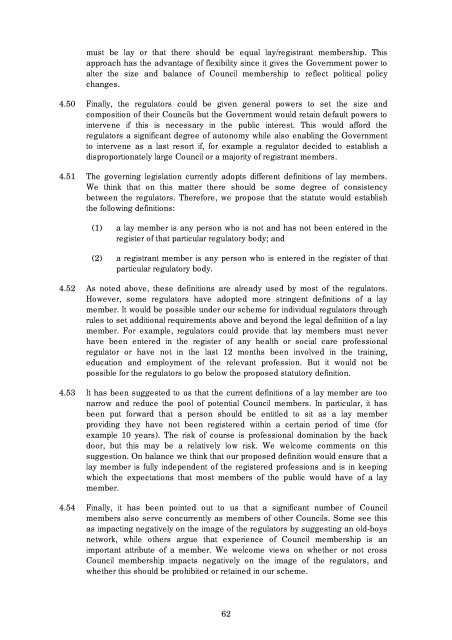Regulation of Health and Social Care Professionals Consultation
Regulation of Health and Social Care Professionals Consultation
Regulation of Health and Social Care Professionals Consultation
Create successful ePaper yourself
Turn your PDF publications into a flip-book with our unique Google optimized e-Paper software.
must be lay or that there should be equal lay/registrant membership. This<br />
approach has the advantage <strong>of</strong> flexibility since it gives the Government power to<br />
alter the size <strong>and</strong> balance <strong>of</strong> Council membership to reflect political policy<br />
changes.<br />
4.50 Finally, the regulators could be given general powers to set the size <strong>and</strong><br />
composition <strong>of</strong> their Councils but the Government would retain default powers to<br />
intervene if this is necessary in the public interest. This would afford the<br />
regulators a significant degree <strong>of</strong> autonomy while also enabling the Government<br />
to intervene as a last resort if, for example a regulator decided to establish a<br />
disproportionately large Council or a majority <strong>of</strong> registrant members.<br />
4.51 The governing legislation currently adopts different definitions <strong>of</strong> lay members.<br />
We think that on this matter there should be some degree <strong>of</strong> consistency<br />
between the regulators. Therefore, we propose that the statute would establish<br />
the following definitions:<br />
(1) a lay member is any person who is not <strong>and</strong> has not been entered in the<br />
register <strong>of</strong> that particular regulatory body; <strong>and</strong><br />
(2) a registrant member is any person who is entered in the register <strong>of</strong> that<br />
particular regulatory body.<br />
4.52 As noted above, these definitions are already used by most <strong>of</strong> the regulators.<br />
However, some regulators have adopted more stringent definitions <strong>of</strong> a lay<br />
member. It would be possible under our scheme for individual regulators through<br />
rules to set additional requirements above <strong>and</strong> beyond the legal definition <strong>of</strong> a lay<br />
member. For example, regulators could provide that lay members must never<br />
have been entered in the register <strong>of</strong> any health or social care pr<strong>of</strong>essional<br />
regulator or have not in the last 12 months been involved in the training,<br />
education <strong>and</strong> employment <strong>of</strong> the relevant pr<strong>of</strong>ession. But it would not be<br />
possible for the regulators to go below the proposed statutory definition.<br />
4.53 It has been suggested to us that the current definitions <strong>of</strong> a lay member are too<br />
narrow <strong>and</strong> reduce the pool <strong>of</strong> potential Council members. In particular, it has<br />
been put forward that a person should be entitled to sit as a lay member<br />
providing they have not been registered within a certain period <strong>of</strong> time (for<br />
example 10 years). The risk <strong>of</strong> course is pr<strong>of</strong>essional domination by the back<br />
door, but this may be a relatively low risk. We welcome comments on this<br />
suggestion. On balance we think that our proposed definition would ensure that a<br />
lay member is fully independent <strong>of</strong> the registered pr<strong>of</strong>essions <strong>and</strong> is in keeping<br />
which the expectations that most members <strong>of</strong> the public would have <strong>of</strong> a lay<br />
member.<br />
4.54 Finally, it has been pointed out to us that a significant number <strong>of</strong> Council<br />
members also serve concurrently as members <strong>of</strong> other Councils. Some see this<br />
as impacting negatively on the image <strong>of</strong> the regulators by suggesting an old-boys<br />
network, while others argue that experience <strong>of</strong> Council membership is an<br />
important attribute <strong>of</strong> a member. We welcome views on whether or not cross<br />
Council membership impacts negatively on the image <strong>of</strong> the regulators, <strong>and</strong><br />
whether this should be prohibited or retained in our scheme.<br />
62
















